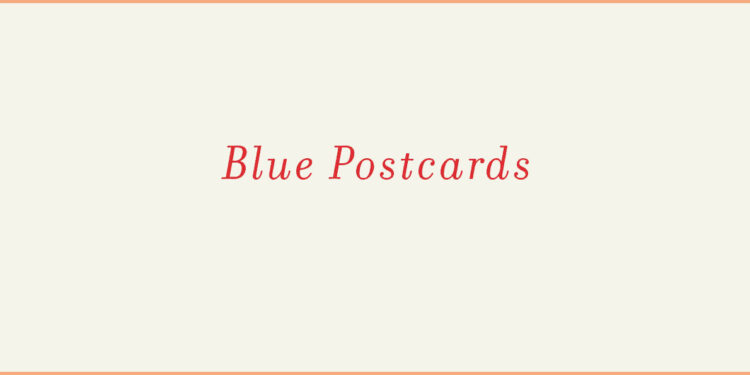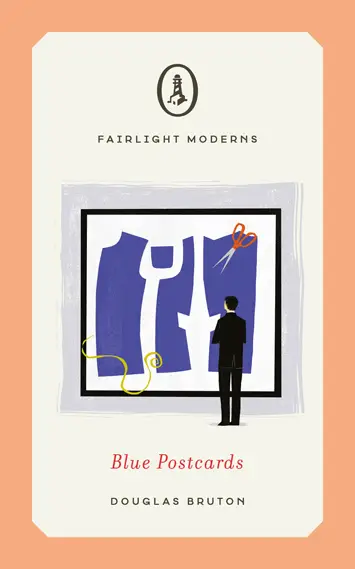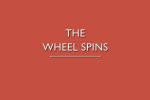Blue Postcards by Douglas Bruton – Review

By Richard Mansfield
This rather unconventionally structured novella is published by Fairlight Moderns, a division within Fairlight Books which was itself founded as recently as 2017. It is said that it seeks to produce innovative fiction and to promote and nurture new writers of quality.
So the title Blue Postcards is not to be mistaken as an allusion to risqué picture cards kept beneath the counter; though, because of a misunderstanding, the topic does indeed make a brief appearance.
In the book several narratives appear and abut onto one another within a Parisian setting over several distinct periods during the last century. The linking theme, in part, is the colour blue and in particular that of Yves Klein Blue, a patented shade introduced to the world by its eponymous creator, an unconventional and perhaps notorious artist of the 1950s and 1960s. Besides the artist, the main characters within the interlinked stories are the artist’s Jewish tailor, the narrator himself and his relationship to the girl from whom he bought his first ‘ YKB blue’ post-marked card at her stall close by the Eiffel Tower.
Compact, and an easy fit for the side pocket of a jacket, this little book, of just over 150 pages, has five chapters, but in this matter convention seems to end. The writing comprises 500 numbered paragraphs, precisely no more nor less, some of which are simply single sentences.
So, at first pick up, this book seems to offer something unusual to the more common reader.
Adjacent to the storyline of the publicity seeking and perhaps unscrupulous artist is the rather more prosaic and poignant tale of the jobbing tailor, lately the sole occupant of what had once been known as ‘the street of tailors’ in Paris. He has the rather charming practice of sewing an unseen tekhelet (blue) thread into his customers’ suits. The thread has religious significance but the tailor’s intention is more to provide luck, a reminder perhaps of where some superstitions originate?
 The tailor, Henri, is the sole family survivor of a Parisian ‘krystallnacht’ type attack on the ‘street of tailors’ in the 1930s, and he is later befriended, towards the novella’s conclusion, by an elderly lady and resident who remembers the character and history of the street and maybe she too shares a survivor’s guilt.
The tailor, Henri, is the sole family survivor of a Parisian ‘krystallnacht’ type attack on the ‘street of tailors’ in the 1930s, and he is later befriended, towards the novella’s conclusion, by an elderly lady and resident who remembers the character and history of the street and maybe she too shares a survivor’s guilt.
“Several narratives”
In the end the artist too suffers terribly for his ‘art’. There is a telling reference much earlier to his possibly being some kind of charlatan with the remark, “There were guards stationed at the doors to give the exhibition some ‘authenticity’”.
An obscure theme in the book is the actual nature of the relationship between the narrator, who has planted himself into the story, and the postcard seller. They both share an appreciation for the colour blue and for swallows, inevitably so, given that birds’ blue flash of colour. But is this relationship where truth and fiction conflate?
One way and another some may find this is not a straight read, though it offers issues to think and ponder upon. The history and interpretations put to the colour blue and its different shades and to colours in general are enlightening. Of the several narratives, the nature of the relationship between the card seller and the narrator proves to be the most enigmatic feature and is undoubtedly meant to be so.
Struggling with the boundaries of truth and fiction was rather over my head, I fear, though it does seem that the term ‘based on’ might apply to the activities and authenticity of Yves Klein’s history.
There is a supporting website that the publisher has created online and the reader, unfamiliar with this type of literature perhaps, may find that reference to its ‘Book Club Notes’ and ‘Writing Notes’ is useful preparation for what lies ahead. This introduces the concept of ‘metafiction’ in literature, something this reviewer (there! I’ve self referenced myself into this piece!) had not previously been overtly aware.
So, this book may be one to charm the more serious and intellectual reader rather than those who relish a straight ahead yarn and page turner.
‘Blue Postcards’ by Douglas Bruton is published by Fairlight Books, £7.99 paperback









